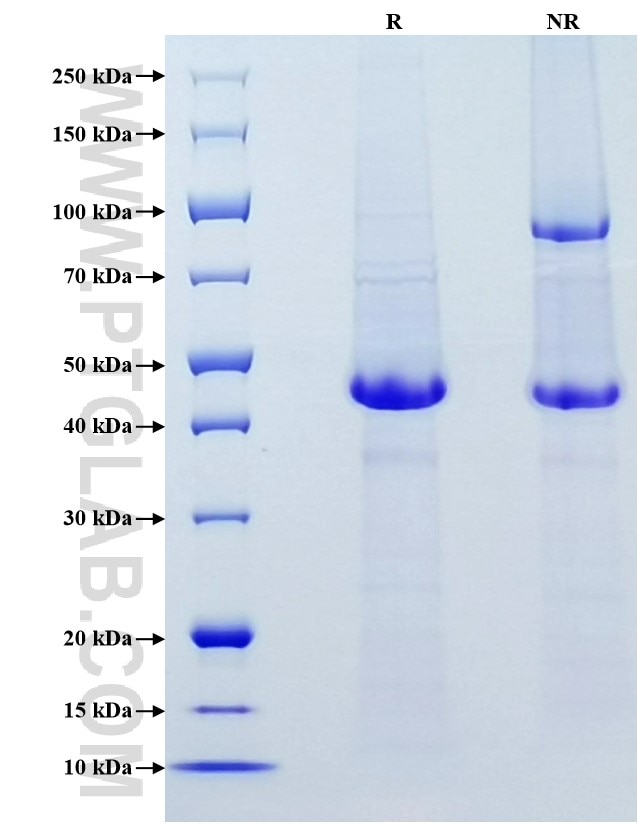Recombinant Human CD138/Syndecan-1 protein (Myc Tag, His Tag)
Species
Human
Purity
>90 %, SDS-PAGE
Tag
Myc Tag, His Tag
Activity
not tested
Cat no : Eg0132
Validation Data Gallery
Product Information
| Purity | >90 %, SDS-PAGE |
| Endotoxin | <0.1 EU/μg protein, LAL method |
| Activity |
Not tested |
| Expression | HEK293-derived Human Syndecan-1 protein Gln23-Gly254 (Accession# AAH08765.1) with a Myc tag and a His tag at the C-terminus. |
| GeneID | 6382 |
| Accession | AAH08765.1 |
| PredictedSize | 28.9 kDa |
| SDS-PAGE | 43-48 kDa, reducing (R) conditions |
| Formulation | Lyophilized from 0.22 μm filtered solution in PBS, pH 7.4. Normally 5% trehalose and 5% mannitol are added as protectants before lyophilization. |
| Reconstitution | Briefly centrifuge the tube before opening. Reconstitute at 0.1-0.5 mg/mL in sterile water. |
| Storage Conditions |
It is recommended that the protein be aliquoted for optimal storage. Avoid repeated freeze-thaw cycles.
|
| Shipping | The product is shipped at ambient temperature. Upon receipt, store it immediately at the recommended temperature. |
Background
CD138, also known as Syndecan-1 (SDC1), is a member of the transmembrane heparan sulfate proteoglycan family. CD138 acts as an extracellular matrix receptor and participates in many cellular functions, including cell-cell adhesion and cell-matrix adhesion. CD138 is expressed on plasma cells and various epithelial cell types. Altered CD138 expression has been described in many different tumor types. CD138 can be shed form the cell surface and exist as a soluble form, which has paracrine and autocrine functions and functions as competitor of transmembrane CD138 for growth factors and other extracellular ligands.
References:
1. M V Dhodapkar, et al. (1998) Blood.91(8):2679-2688. 2. Fionnuala P O'Connell, et al. (2004) Am J Clin Pathol. 121(2):254-263. 3. Robin E Gandley, et al. (2016) PLoS One. 11(6):e0157608. 4. Simon Kind, et al. (2019) Dis Markers. 2019:4928315.

